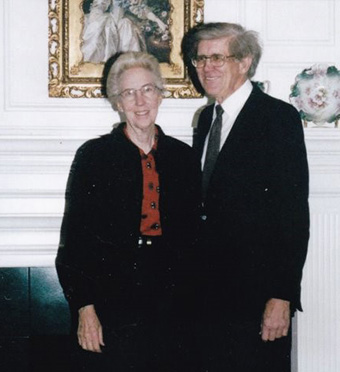Simmons Cancer Center benefits from Quarnstrom estate gift

Marjorie and Charles Quarnstrom
By Sharon Reynolds
Marjorie Quarnstrom envisioned a day when she could make a difference in the lives of people with cancer. She fulfilled her wish with an estate gift of $1.8 million to support gastrointestinal (GI) cancer research at UT Southwestern’s Harold C. Simmons Comprehensive Cancer Center.
Faye Bagby, Mrs. Quarnstrom’s trusted financial adviser and good friend, recalled a conversation they once had about charitable giving.
“With no children to leave her estate to, Marjorie wanted to do something that would help others,” Ms. Bagby said. “She knew many people who suffered from cancer. We were very impressed to learn about the different medical research projects going on at UT Southwestern. Marjorie joined The Heritage Society and put UT Southwestern in her will, grateful that she had the means to help others and save lives.”
“We are grateful for Mrs. Quarnstrom’s generosity and desire to make a difference,” said Dr. Daniel K. Podolsky, President of UT Southwestern. “Gastrointestinal cancers are complex, and her estate gift will support research that advances understanding about the causes of GI cancers and leads to new treatments for them.”
Happy beginnings, happy life
The Quarnstrom story began in 1949, when Marjorie Esther Byrd married Charles G. Quarnstrom in Happy, Texas – a small town in the Texas Panhandle known as “The Town Without a Frown.” They settled in Amarillo on a 1,000-acre farm where Mrs. Quarnstrom’s family had lived for generations. Mr. Quarnstrom was a chemical engineer who worked for the former United States Bureau of Mines, the primary government agency that conducted scientific research of the country’s mineral resources at the time. Mrs. Quarnstrom, a gifted pianist and music teacher, gave private piano lessons to children on her beautiful baby grand piano.
The Quarnstroms were a private couple who lived simply and frugally. They enjoyed their life together and cared deeply about making life better for others. Mr. Quarnstrom died in 2010, followed by Mrs. Quarnstrom’s death in 2016. Ms. Bagby said she believes Mrs. Quarnstrom would have been pleased that her gift is propelling discovery and hope for others with cancer.
Clinical trials transform cancer care
Dr. Carlos L. Arteaga, Director of the Simmons Cancer Center and Associate Dean of Oncology Programs at UT Southwestern, said philanthropy plays an important role in cancer discovery and exceptional patient care.
“This gift is a celebration of Mrs. Quarnstrom’s life and memory and an inspirational example of her altruistic spirit,” Dr. Arteaga said. “With these funds, we will be able to support a number of laboratory-based translational research initiatives and clinical trials in gastrointestinal cancer. This gift will further enhance the impact of the Simmons Cancer Center on reducing the burden of cancer for patients in North Texas and beyond.”
Each year, more than 250,000 people in the U.S. are diagnosed with a GI cancer, which includes colorectal, gallbladder/bile duct, liver, pancreatic, and stomach cancers. Treatments for GI cancers are complex, and for some patients, standard care options are ineffective.
With its broad network of scientific and clinical partners to develop new cancer insights and treatments, the Simmons Cancer Center is an incubator for cancer discovery. Clinical trials – including dozens testing new cancer treatments and strategies for screening and prevention – are conducted at UT Southwestern and partner sites across North Texas.
Clinical trials allow physician scientists and clinicians to translate laboratory discoveries into approved therapies. UT Southwestern offers many new GI cancer treatments through clinical trials that are in the earliest stages of development, often before these treatments are available elsewhere.
Dr. Arteaga described clinical trials as the only mechanism for physicians and investigators to get new and better drugs approved through the Food and Drug Administration. Patients in clinical trials are followed very closely by a group of physicians, as well as by a team of nurses and other highly skilled providers, and receive the best care available.
“By participating in clinical trials, our patients are our partners in research,” he said. “They have a perspective that we don’t have as investigators. They’re an invaluable part of how we move forward. We cannot do it without them.”
Committed to reducing cancer mortality, Dr. Arteaga and his team are optimistic about the future of cancer care.
“We’ve made enormous progress,” he said. “I think that we live in an unprecedented time in the history of cancer care and research. The momentum has never been greater. And I think the next 10 years are going to be transformative in the way we think of cancer, in the way we understand cancer, and in the way we go about treating it. Generous donors like Mrs. Quarnstrom are advancing science, and we are truly grateful.”
Dr. Arteaga holds The Lisa K. Simmons Distinguished Chair in Comprehensive Oncology.
Dr. Podolsky holds the Philip O’Bryan Montgomery, Jr., M.D. Distinguished Presidential Chair in Academic Administration, and the Doris and Bryan Wildenthal Distinguished Chair in Medical Science.